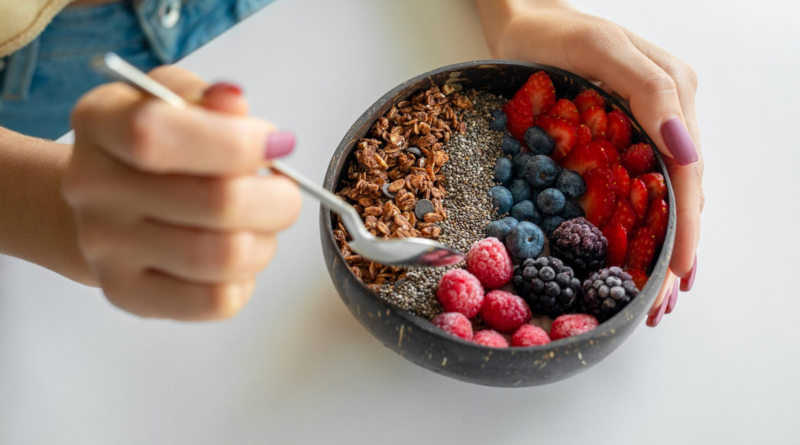11 benefits of chia seeds from gut health to weight loss
It’s long been known that chia seeds are a “superfood”—and new research provides even more reasons to back the assertion.
What are the health benefits of chia seeds?
Chia seeds are tiny and round, and come in colors like black, brown, and white. They’re a member of the mint family, and related to rosemary and scarlet sage, among other herbs.
Like its genetic relatives, chia seeds known to offer a wealth of nutritional benefits. They’re high in fiber and contain healthy fats and protein. What’s more, their flavor is mild, making them an easy add to many well-loved dishes like smoothies, yogurt, oatmeal, pancakes, and granola bars.
But the tiny speckled seeds offer more than a simple nutrient boost. Among their near-medicinal properties—thanks to their polyunsaturated fatty acids, protein, and fiber, in particular—according to researchers at Oregon State:
- Improved heart health and cholesterol
- Anti-cancer properties
- Anti-inflammatory properties
- Antimicrobial properties
- Antioxidant properties
Additional health benefits of chia seeds, thanks to the generous helping of fiber they contain, include:
- Improved intestinal health
- Weight loss and management
- Decreased risk of developing diabetes
And there’s more. According to Harvard Health, chia seeds are also beneficial for:
- reducing blood pressure
- protecting against chronic disease
- improving anxiety and depression
What is chia seed water?
Chia seed’s high fiber content is why you might see so many people on social media creating their own gut-friendly cocktail: chia seed water.
The recipe is relatively simple—one to two tablespoons of chia seeds mixed into water. While some people like to add honey and lemon to give it some flavor, others just keep it plain with water and chia seeds.
Health and wellness influencers and even some doctors have touted chia water’s benefits for gut and digestive health as well as for weight loss support by keeping you fuller longer.
Dr. Tommy Martin, doctor of internal medicine and pediatrics, explained on TikTok that chia seeds are “extremely nutrient dense.” Just one ounce provides 10 grams of fiber and 5 grams of protein, according to the Cleveland Clinic. The combination of water and fiber-packed chia seeds has the potential to keep you regular, he says, but there are no scientific studies that prove the beneficial properties of chia seed water.
There are some things you should know before you start chugging chia seed water.
The combination of drinking lots of water while taking in a high amount of fiber could lead to unpleasant side effects, like bloating, gas, and constipation, according to the Cleveland Clinic.
You don’t have to add chia seeds to your water to get their numerous health benefits, however. Since they are easy to incorporate to meals and snacks, you can stick to mixing them into oatmeal or sprinkling them on top of smoothie bowls.
The vast potential of chia
Scientists at Oregon State University recently sequenced the chia genome, as detailed in a paper published last year in Frontiers in Plant Science. The team was the first to take a deep dive into the genetics behind the crop’s nutritional properties—and make a case for why chia seeds may be one solution to the world’s hunger and nutrition crisis.
Researchers looking to genetically optimize crops have mainly focused on cereals like rice, wheat, maize, and millets; small grains; legumes; oilseed; and tuber crops. Next, they must turn to the improvement of “minor” or “orphan” crops like chia, cassava, yam, small grains, and pulses, the study authors contend. During the study, scientists were able to locate genetic markers associated with the grain’s nutritional properties. Those wanting to create nutritionally improved chia seeds can use the list as a starting point for their research.
“We are at the point where long-term food and nutrition security requires diversifying the human diet by breeding and making genetic improvement to nutrient-rich, so-called ‘minor crops’ like chia,” Sushma Naithani, an associate professor in the university’s Department of Botany and Plant Pathology, said in a news release about the study.
More good news: The ability of chia to grow in marginal lands helps mitigate the threat posed by global climate change, researchers wrote. They hope to bring chia farming to Oregon, where climate conditions are similar to those in South America, where chia is primarily grown. Already, researchers at the University of Kentucky are leading the charge for chia development in the state.
“This research opens up possibilities for scientists to study chia seed through the lens of improving human health, while at the same time continuing to further our knowledge of all the nutritional benefits of chia,” Pankaj Jaiswal, a professor at Oregon State University’s Department of Botany and Plant Pathology, said in the release.



